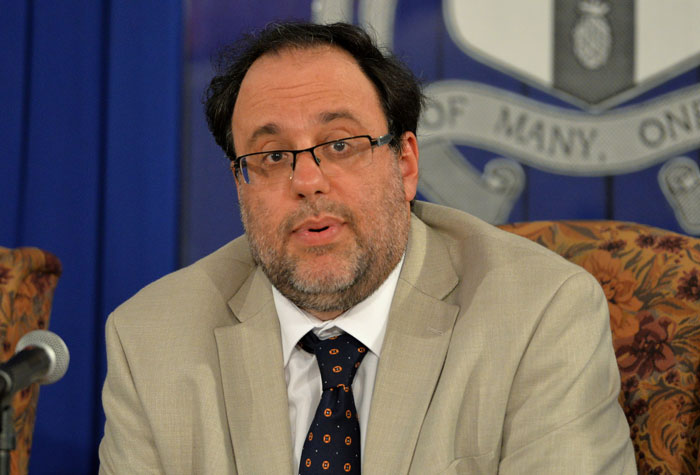No Fall-Out Expected From Decision on Ganja –Justice Minister
By: , June 13, 2014The Key Point:
The Facts
- Senator Golding said international agreements relating to ganja, to which Jamaica is party, place “certain limitations” on changes that can be made to local laws.
- He said that ‘drug’, as defined, includes cannabis (ganja), cannabis resin, and extracts and tinctures of cannabis, as such “the prohibitions imposed by that Convention, apply to ganja.”
The Full Story
Justice Minister, Senator the Hon. Mark Golding, says no fall-out is anticipated between Jamaica and its international partners, consequent on the proposed decriminalization of ganja for medical/medicinal and religious purposes, and personal use.
Addressing journalists at Thursday’s (June 12) media briefing at Jamaica House, where he made the announcement, Senator Golding said international agreements relating to ganja, to which Jamaica is party, place “certain limitations” on changes that can be made to local laws without the country violating its international obligations.
These principal international agreements are: the 1961 United Nations (UN) Single Convention on Narcotic Drug and the 1972 Protocol Amending the Single Convention; the 1971 UN Convention on Psychotropic Substances; and the 1988 UN Convention Against Illicit Traffic in Narcotic Drugs and Psychotropic Substances.
The Minister explained that the Single Convention, as amended, limits the production, manufacture, export, import, distribution, trade in, and use and possession of drugs, except for medical and scientific purposes.
He said that ‘drug’, as defined, includes cannabis (ganja), cannabis resin, and extracts and tinctures of cannabis, as such “the prohibitions imposed by that Convention, apply to ganja.”
Senator Golding said concerns have been raised, particularly in the Caribbean, that the strictures imposed by these international drug-related agreements need to be reviewed by State parties, in light of current developments and trends.
“This is an important item on the Agenda of CARICOM. But, until the stipulated requirements are reviewed and adjustments made, we are obliged to make such changes that are permissible within the present scheme of international obligations,” he added.
The Minister pointed out, however, that the relevant Conventions recognize the principles of member states’ Constitutions according them the right to control, restrict, and impose sanctions in respect of prohibited activities relating to drugs.
“This, we submit, provides some flexibility in the treatment of the use and possession of ganja in our local context. The rights guaranteed under the Charter of Rights, and in particular the right to privacy and freedom of religion, are of special significance. Of relevance also, to the proposed decriminalization of ganja for medicinal and research purposes is the fact that medical and scientific purposes are expressly recognized exceptions under the relevant Conventions,” he stated.
The proposed amendment of Jamaica’s Dangerous Drugs Act, which Cabinet approved last week, will facilitate ganja’s usage for therapeutic purposes, as prescribed by a registered practitioner, or for scientific research conducted by an accredited tertiary institution or otherwise approved by the Scientific Research Council (SRC).
The changes will also enable the use of ganja in religious engagements by interests, such as Rastafarians. Additionally, they will make the possession of small quantities, amounting to two ounces (0.057 kilogrammes) or less, a non-arrestable but ticketable infraction, attracting a fine payable outside of the court, but not attracting a criminal record.


